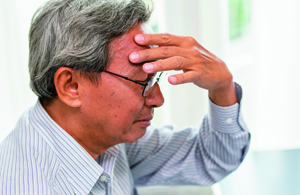Concussions: Not just for kids and athletes
9/18/2025 by Kyle McKenzie, M.D.

Concussions can make headlines, especially when it comes to kids and athletes. Many parents are vigilant — ensuring seat belt use, helmet use and carefully weighing the risks of contact sports. But what about adults? Brain injuries can happen at any age.
Whether it's slipping on ice, a car accident, falling off a bike, or bumping one’s head on a cabinet door, adults are also at risk of a concussion. Those who are 65 years old and older tend to be more vulnerable to the effects of head injuries. Even what might seem like a minor bump can cause a concussion — and recovery may also take longer.
What is a concussion?
A concussion happens when a hit or jolt causes the brain to move inside the skull in a way it should not. There are often no structural changes seen on imaging, but there is a disturbance of brain function causing the symptoms noted below. Therefore, the diagnosis is made with careful history and exam, and imaging is often not needed.
A single concussion can have lasting effects, such as trouble with memory. Just like in children, repeated concussions in adults increase the risk of long-term complications. Falls, car accidents and physical assault are just some of the possible causes of concussions. Symptoms might appear within minutes of the injury, but can be delayed for up to 72 hours.
Common symptoms in adults
- Headaches.
- Difficulty thinking clearly or concentrating, often called "brain fog."
- Dizziness.
- Nausea or vomiting.
- Fatigue.
- Mood changes or withdrawal from social activities.
Family and friends might also notice:
- Sleeping more or less than usual.
- Mood swings or increased irritability.
- Memory problems, like repeating questions or delayed responses.
When to seek medical help
Do not dismiss symptoms as just part of getting older or assume they are "not that bad." You should seek emergency care if:
- You are on a blood thinner and hit your head. In this instance, head imaging may be indicated.
- You have a worsening headache, repeated vomiting, seizures, slurred speech or unusual behavior.
For less urgent symptoms that still interfere with daily life, it is a good idea to check in with your healthcare clinician. Earlier involvement of clinical care has been associated with faster recovery after a concussion.
Managing a concussion
There is no simple cure for a concussion, but symptoms can be treated while working back to prior activity. Prolonged periods of rest are no longer recommended. Instead, a brief period of rest followed by gradual return to activity as tolerated is now recommended. Additional treatment might include medication for headaches or physical and occupational therapy to improve balance and manage dizziness.
How to prevent concussions
The same safety tips that apply to kids are smart for adults too, and it is good for us to model these behaviors for the kids around us.
- Always wear your seat belt.
- Use helmets when biking, skiing or doing other high-risk activities.
- Prevent falls at home by removing trip hazards (like extension cords, clutter or loose rugs) and keeping walkways dry and clear.
Stay active and enjoy life — but remember to protect your head.
Kyle McKenzie, M.D., is a Community Internal Medicine, Geriatrics, and Palliative Care physician. He is a fellowship-trained geriatrician who provides care in the homebound programs and skilled nursing facilities in Rochester and the surrounding areas.
